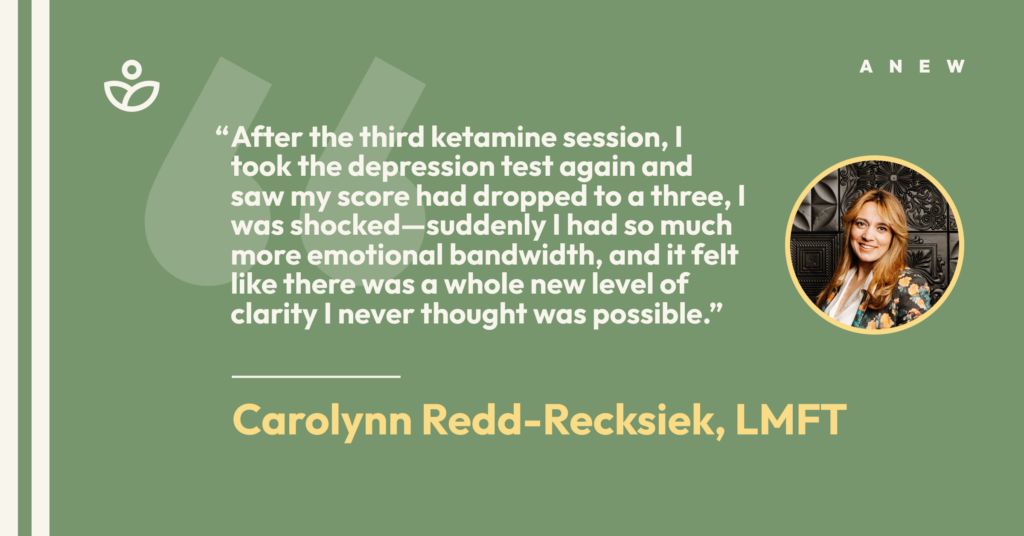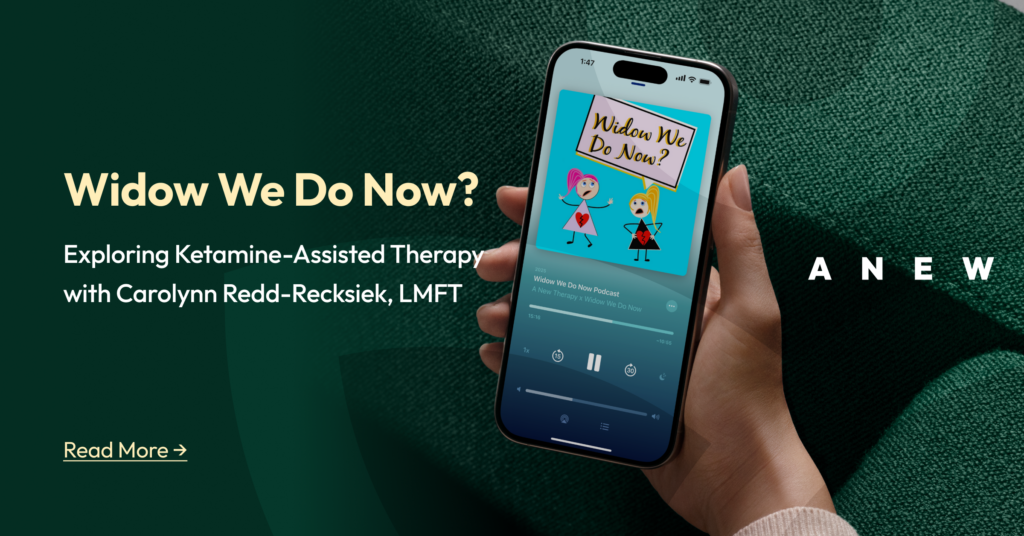Ketamine-assisted therapy is becoming increasingly recognized as a transformative treatment option for those who struggle with mental health challenges that haven’t responded to traditional therapies. Recently, Carolynn Redd-Recksiek, LMFT, a therapist at Anew Therapy, joined Anita and Mel, hosts of the popular podcast Widow We Do Now, to discuss the benefits, misconceptions, and personal experiences surrounding ketamine-assisted therapy.
How Ketamine-Assisted Therapy Works
Ketamine, originally developed as an anesthetic, has gained attention for its remarkable potential in mental health treatments. Carolynn explains, “Ketamine actually helps the brain either repair neural pathways or create new neural pathways, which is different from traditional antidepressants that typically just inhibit or excite receptors.”
This unique property makes ketamine particularly effective for conditions like depression, anxiety, PTSD, chronic pain, and OCD, especially in patients who have found little relief from conventional approaches.
A Therapist’s Personal Journey with Ketamine
Carolynn Redd-Recksiek, LMFT, shared her personal journey with ketamine-assisted therapy at Anew Therapy, providing valuable insights from her dual perspective as both a therapist and a patient. Throughout her life, Carolynn experienced persistent anxiety and depression, which intensified profoundly after losing a child. Despite extensive engagement with traditional therapy and medications, she found herself searching for something more effective.
“I’ve struggled with anxiety and depression most of my life, and losing a child amplified those struggles, making them feel almost unbearable at times,” Carolynn explained. “I’ve done extensive therapy and used medications that helped manage symptoms, but ketamine therapy took my healing to a new level.”
Before we delve into Carolynn’s remarkable transformation, it helps to understand how she measured her progress. The PHQ-9 is a standard questionnaire used to gauge the severity of depression, with scores ranging from 0 to 27. Generally:
- 1–4 indicates minimal depression
- 5–9 indicates mild depression
- 10–14 indicates moderate depression
- 15–19 indicates moderately severe depression
- 20–27 indicates severe depression
Carolynn explains, “After the third ketamine session, I took the depression test again and saw my score had dropped to a three, I was shocked—suddenly I had so much more emotional bandwidth, and it felt like there was a whole new level of clarity I never thought was possible.”
Throughout her series of ketamine sessions, Carolynn noticed remarkable improvements not only in her mood but also in her capacity to cope with daily stressors. She described a noticeable shift in her overall well-being, mentioning that ketamine therapy provided her a depth of emotional healing that previously seemed unattainable. She was even able to reduce her reliance on antidepressants without negative side effects. For Carolynn, ketamine-assisted therapy offered a transformative experience, empowering her with fresh perspectives and renewed hope for the future.

Why Ketamine-Assisted Therapy Works
Ketamine-assisted therapy has emerged as an innovative treatment that addresses mental health from a unique angle. Unlike traditional antidepressants, ketamine works rapidly—often within just a few treatments—by targeting specific receptors in the brain associated with learning, memory, and emotional regulation. This unique approach helps patients build new neural pathways, allowing them to process and heal from past traumas effectively.
Carolynn explained, “Ketamine facilitates the brain’s natural healing processes by allowing it to address emotional wounds directly. Instead of numbing emotions, ketamine helps patients face difficult feelings safely and effectively.”
Who Can Benefit From Ketamine Therapy?
Ketamine therapy can be a highly beneficial option for individuals dealing with persistent anxiety, depression, PTSD, chronic pain, OCD, and other conditions that haven’t responded adequately to traditional treatments. It’s particularly powerful for those who have found little relief through medication or therapy alone.
“Ketamine isn’t a one-size-fits-all solution,” Carolynn emphasized, “but it has proven particularly effective for individuals who’ve felt stuck or hopeless despite years of therapy or medication.”
What to Expect During Treatment
Ketamine treatments at Anew Therapy typically involve intramuscular injections or an FDA-approved nasal spray called Spravato. Sessions usually last about two hours, including time for preparation, the administration of the medication, and recovery.
During treatment, patients often enter a dissociative state, which allows them to explore deeply rooted emotional and psychological issues safely. While this experience can seem unusual, Carolynn reassured, “The dissociation during ketamine therapy isn’t something to fear—it’s actually the space where profound healing happens.”
The Importance of Professional Support
One key factor for successful outcomes with ketamine therapy is receiving treatment in a supportive, clinically supervised environment. Carolynn highlighted the risks of undergoing ketamine treatment without proper professional support, noting that patients with significant trauma could have adverse experiences if they’re not adequately supported.
“At Anew Therapy, we prioritize patient safety and comfort,” Carolynn said. “Medical professionals carefully monitor each session, ensuring patients feel secure and supported throughout their experience.”

Integrating Therapy for Long-Term Success
Another crucial element of ketamine-assisted therapy is integrating traditional therapeutic support before, during, and after treatments. Having a therapist present or participating in talk therapy alongside ketamine treatments can significantly enhance the healing process.
“Therapy integration is vital,” Carolynn shared. “Patients who engage in therapy alongside their ketamine sessions tend to see longer-lasting, more substantial improvements in their mental health.”
Conclusion: Is Ketamine-Assisted Therapy Right for You?
Choosing the right treatment for mental health can be challenging and deeply personal. Ketamine-assisted therapy has provided a beacon of hope for many who feel stuck in cycles of depression, anxiety, trauma, and chronic pain. It offers rapid relief and meaningful improvement, especially for those who have not found success through traditional methods.
If you or a loved one is struggling, you don’t have to face it alone. At Anew Therapy, we are committed to providing compassionate, comprehensive support in a safe and nurturing environment. Your mental health journey matters deeply to us, and we are here to guide you through every step.
We invite you to reach out and schedule a consultation with Anew Therapy today. Discover how ketamine-assisted therapy could be the turning point you’ve been searching for.
Visit Anew Therapy Utah to learn more and begin your journey to healing.

Searching for the best ketamine clinic in Utah? Anew Therapy offers expert care and proven results. Schedule your free intake appointment today.

